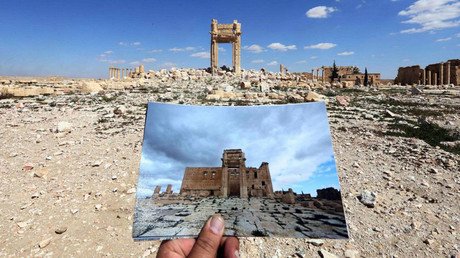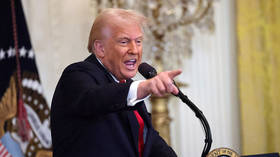‘Time to build new Syria’: Russian deputy defense minister speaks of op & peace in RT exclusive
Moscow’s current objective in Syria is to ensure that peace process gains pace so that people can return to normal life, Russia’s deputy defense minister, Anatoly Antonov, told RT in an exclusive interview.
Although the situation in Syria is “very fragile and very volatile…Russia and all other countries must do their utmost to strengthen this fragile peace, so that no one is able to undermine it,” Anatoly Antonov told RT.
Nurturing peace is one of the primary goals for Russia in Palmyra - a cradle of ancient civilization and a UNESCO world heritage site - after it helped Syria liberate it from terrorists last month, Antonov said. The operation was a major strategic victory for Damascus and Moscow, which provided air support for Syrian troops. It was also “a pivotal moment of the Syrian operation.”
Russian sappers are currently deployed in Palmyra disposing of improvised explosive devices and landmines planted by Islamic State [IS, formerly ISIS] when it was in control of the city. Moscow sees a major opportunity for international cooperation in this work, Antonov said.
“Our military engineers started mine clearance at this place, which is a legacy of the entire humanity. I believe the mine clearance issue is so big and vital in Syria that it would be right for the international community to offer its contribution and joined the Russian military’s effort,” he said, adding that Moscow has proposed such cooperation to the UN and international organizations dealing with demining.
The Russian military is also delivering humanitarian aid and help organizing vital industries disrupted by the Syrian war.
“Footage shown on television recently shows our troops organizing the baking of bread. What we do is try to make life easier for the common people, so that they can breathe in and feel this truce,” Antonov said. “Enough with war, it’s time to build a new Syria.”
Russia sent its warplanes to Syria and started airstrikes on terrorist forces in September. Over five months, with Russia’s help, the Syrian troops turned the tide of battle. This paved the way for a shaky truce with militias that were willing to seek a political transition in Syria.
Russia pulled out part of its Syrian deployment in March, but continues to help Damascus in its continued fight against terrorist organizations like IS and Al-Nusra Front, which are not party to the ceasefire.
“During our operation, much has been done. We delivered a huge blow to the terrorists, destroying many weapons caches, militants, their command and control structures as well as miscellaneous groupings,” Antonov told RT.
“We also targeted terrorism financing,” he added. “Everyone perfectly knows where terrorists’ money comes from – illicit oil trade. Everyone knows how the stolen oil is being smuggled from Syria, and where the money goes.”
The deputy minister was alluding to Turkey, which Russia accuses of profiting from the war in Syria. In November last year, Moscow released intelligence saying that Turkey’s leadership personally benefits from having commercial ties to IS.
Many subsequent media reports, including those of RT, shed light on flourishing illicit trade in oil, stolen artifacts and other goods, and also supply routes, between Turkey and the terror group.
Antonov spoke to RT ahead of the 2016 Moscow Conference on International Security – a reputed political event which will gather senior military and security decision-makers from all over the globe on April 27-28 in Moscow. It will feature representatives from at least 80 countries, three deputy prime ministers, 20 defense ministers, 15 chiefs of staff, 10 international organizations and military delegations.
Combatting international terrorism in Europe, the Middle East, Central Asia, and beyond will be at the heart of the conference’s agenda.














